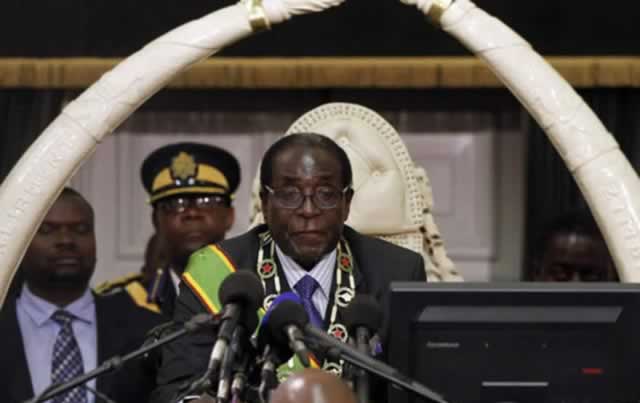Eighth Parliament, 12 months removed


FLASHBACK . . . President Mugabe opens the First Session of Zimbabwe’s Eighth Parliament in September last year. Some MPs are still to make their maiden speeches 12 months after being voted into the august House
Lloyd Gumbo Mr Speaker Sir
What is most disturbing is that some portfolio committees chaired by Zanu-PF MPs resemble praise sessions when they summon ministers to appear before them.
On this date last year, the world woke up to the news that Zanu-PF had vanquished MDC-T in the harmonised elections – Presidential, parliamentary and local authorities race with a convincing sweep.
Zanu-PF presidential candidate President Mugabe was declared the winner after polling 61,09 percent with MDC-T leader Mr Morgan Tsvangirai scoring 33,94 percent while Professor Welshman Ncube only managed a paltry 2,68 percent.
In the National Assembly, Zanu-PF got 197 seats after factoring in 60 women elected by proportional representation, while MDC-T managed 70, MDC two with one independent.
In the Senate, Zanu-PF also dominated with 37 members, to MDC-T’s 21, MDC’s two, 18 chiefs and two representatives of people living with disabilities.
After the official announcement of the parliamentary results, it was a routine win for some Zanu-PF long-serving MPs, a return for some and new entry for others.
It became apparent that the revolutionary party commanded two-thirds majority in the Lower House whose threshold is 180 legislators, meaning that it was in total control of parliamentary business as it could pass legislation or amend the Constitution regardless of the actions by the opposition.
Since the turn of the millennium, Parliament had lost its dignity as bickering between Zanu-PF and MDC became the order of the day as they held the House to ransom by walking out whenever they felt they were losing it on the debating platform.
Given the fact that no party commanded two-thirds majority, they knew boycotting and walking out would bring the House to a standstill.
As such, having a two-thirds majority after more than 10 years came as sweet news to some people who expect Parliament to perform its constitutional duties without trivialising the third arm of the State.
It’s almost a year since MPs were sworn in but one is tempted to say there has been no major shift in terms of how Parliament has performed since September.
There is no reason to talk about the losers because they are a nonentity as far as governance and the future of the country is concerned so the winners must take all the blows.
The winners have behaved as if they were the losers as they have failed to stamp their authority in promoting the development discourse that characterised Parliament before the 2000 parliamentary elections that saw Zanu-PF and MDC going neck to neck.
There was a lot of expectation from the electorate that Zanu-PF would use its two-thirds majority to push issues that fulfil its election manifesto.
But the list of things that are yet to be done is longer than what Parliament has accomplished so far.
There are clear benchmarks that one can use in assessing parliamentary performance and holding the executive to account, representing the people and law-making.
But can one stand up today and say Parliament has lived up to these responsibilities or it’s the same old story of trivial debates in the House compounded by ministers ducking parliamentary motions and questions?
Instead of using their majority to make reasonable contributions in the House, some Zanu-PF backbenchers think they were elected so that they could heckle the minority who in all fairness are irrelevant in the governance of the country besides giving credence to Zimbabwe as a multi-party democracy.
There are some Zanu-PF MPs who are yet to deliver their maiden speeches in Parliament while some of them have only been vocal in affirming the adjournment of the House.
Only a handful have moved motions in the House, let alone debate despite the fact that they are constitutionally allowed to debate using any of the 16 official languages though at the moment Shona, Ndebele and English are the main languages used for administrative purposes.
It is unfortunate that some think they were elected just to be given coupons and allowances for setting foot in the House without contributing anything.
If Zim-Asset’s Results-Based Management system were to be adopted in Parliament based on how many times an MP contributes, Treasury would save a lot of money.
The revolutionary party has taken its majority for granted judging by the way it has conducted itself during this session.
Ministers have not helped matters, as they continue to snub Parliament to respond to motions or questions with the presiding officers warning them for the umpteenth time and urging them to take parliamentary business seriously.
If the ruling party’s ministers can consistently snub Parliament at will, then are legislators expected to take them seriously?
The same ministers who are supposed to initiate re-alignment of existing laws to the Constitution have not been forthcoming as reported by Justice, Legal and Parliamentary Affairs permanent secretary Mrs Virginia Mabhiza when she appeared before the Portfolio Committee on Justice, Legal and Parliamentary Affairs early this week.
“When the new Constitution was signed into law, it was envisaged all ministries would naturally and quickly identify all laws in their respective portfolios for review and also to formulate new policies, which will lead to enactment of new laws,” said Mrs Mabhiza.
“However, due to reasons beyond the control of the Ministry of Justice, our department of legislative drafting has not been receiving much instruction in the volumes commensurate with the expectations of a new constitutional dispensation.
“All I am saying is that it is not only the responsibility of the Ministry of Justice to see to it that we successfully align all our laws to the new Constitution, but we need the co-operation of other ministries to meaningfully finish this task. In other words, the honourable House can interrogate the other ministries because we cannot initiate policies for other ministries.”
Yes, it is not the responsibility of ministers to look at legal issues because that falls under legal departments within the ministries but by virtue of being heads they must endeavour to fulfil Government’s commitment to align laws.
They surely cannot be bystanders at a time they are expected to fulfil what President Mugabe assigned them to do.
It is unfortunate that our parliamentarians do not appreciate the power that they have, bar the recent threat by presiding officers that they would be forced to take action against errant ministers.
Parliament has the power to summon any minister who undermines its authority and can charge them with contempt.
Justice, Legal and Parliamentary Affairs Minister Emerson Mnangagwa recently said the ball was in Parliament’s court to deal with errant ministers.
What is most disturbing is that some portfolio committees chaired by Zanu-PF MPs resemble praise sessions when they summon ministers to appear before them.
Instead of holding ministers to account, chairpersons appear to be the lead singers as they shower praises on ministers including some who have not done much.
Holding the executive to account should not be an academic exercise, but should be seen by deeds.
So far, only a handful of MPs have managed to tense up to make sure ministers justify their appointments.
Feedback: [email protected]










Comments